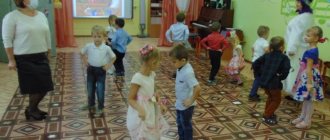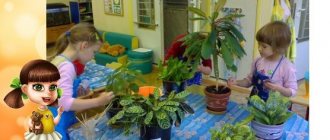Features of environmental education for preschool children
Features of environmental education for preschool children
Modern problems of the relationship between man and the environment can be solved only if an ecological worldview is formed in all people and their ecological culture is improved. Today, more and more countries, including Russia, are joining the implementation of the concept of “sustainable development”, according to which humanity must coordinate its activities with the laws of nature, change the consumer attitude towards nature to recognize its intrinsic value. An important condition for the transition of modern society to “sustainable development” is environmental education.
Environmental education of preschool children is recognized in our country as a priority area in education in general. In recent years, a large number of specialists from preschool institutions have been dealing with this problem, and a number of new programs have been created.
Preschool age is distinguished by the peculiarities of living conditions and requirements that are presented to the child at this stage of his development, the specifics of his relationships with the outside world, the level of development of the psychological structure of the child’s personality, his knowledge and thinking, and a set of certain physiological characteristics.
When selecting the content of environmental education for preschoolers, the following principles must be taken into account.
— scientific character and accessibility — acquaintance of preschoolers with a set of elementary scientific environmental knowledge, which serves as the basis for the formation of motivation for a child’s actions, the development of cognitive interest, and the formation of the foundations of a worldview;
- humanism - raising a person with new values, who knows the basics of consumer culture, cares about his health and wants to lead a healthy lifestyle; having an understanding of the diversity of nature’s values: aesthetic, moral, cognitive, practical, etc.;
- systematicity - reflected in the character, logic, sequence of presentation of material, organization of work in a preschool institution, in the study of living objects as systems of different levels.
- integrity - a reflection, first of all, of the preschooler’s holistic perception of the world around him and the child’s unity with the natural world).
Revealing the beauty of nature to a child and teaching him to see it is a difficult task.
To do this, the teacher needs to live in harmony with nature, and children, as active participants in the educational process, are ready to imitate his every move.
They are very observant and attentive to the words of the teacher, they are good at distinguishing positive and negative in the actions of adults.
Ecological education, sincere love for nature means not only a certain state of mind, the perception of its beauty, but also its understanding and knowledge.
What is the role of nature in shaping the personality of a preschooler?
Nature is the most important means of education and development of preschool children.
How many discoveries a child makes when communicating with her!
Every living creature seen by a baby is unique. There are also a variety of natural materials (sand, clay, water, snow, etc.) with which children love to play.
Preschoolers communicate with nature at different times of the year: when there is fluffy white snow and when the gardens are blooming. Together with adults, they rejoice in the coolness of the water in the summer heat and the murmur of a forest stream, the varied herbs of meadows, delicious berries and the smells of forests.
No didactic material can compare with nature in terms of diversity and strength of developmental impact on the child. Objects and natural phenomena are clearly presented to children. Thus, a preschooler directly, with the help of his senses, perceives the variety of properties of natural objects: shape, size, sounds, colors, spatial position, movement, etc.
He develops initial concrete and vivid ideas about nature, which in the future will help him see and understand the connections and relationships of natural phenomena and learn new concepts. Children learn many connections and relationships between natural phenomena through observation.
The variety of natural objects allows you to organize interesting and useful activities for children. In the process of observing, playing and working in nature, I introduce children to the properties and qualities of objects and natural phenomena, focusing children’s attention on their changes and development.
The development of a child’s personality is positively influenced by assignments in nature.
This is the most accessible form of labor, which has a tangible and significant result. By caring for plants and animals, the child shows concern for nature.
In work there is an active process of cognition and application of acquired knowledge. Knowledge about nature helps children navigate the qualities, characteristics and properties of objects. Therefore, if we talk about the tasks facing a teacher introducing children to nature, the first among them will be the formation of an elementary system of knowledge in children. The development of a cognitive attitude towards nature in children is associated with the assimilation of a knowledge system. It manifests itself in curiosity, the desire to learn as much as possible.
The role of knowledge in the formation of labor skills and abilities is great. Knowing about the needs of plants and animals, that these are living organisms that need to be taken care of, the child will strive to master various ways of caring for plants and animals, and choose them correctly in a given case.
Knowledge about nature encourages children to treat it with care. Good deeds and actions are reinforced by the awareness of the correctness and necessity of such behavior for the purpose of protecting nature. However, a caring attitude towards nature cannot be formed only on the basis of knowledge. Labor in nature is a manifestation of active care for it.
This leads to the second task - the formation of labor skills and abilities in children. Labor skills and abilities acquired in childhood are not destroyed - they are further improved, turning into more complex types of work. Assignments attract children, make them happy and want to take care of plants and animals.
Third task: developing children's love for nature. This task arises from the humanistic orientation of education in our society and the need to protect nature - the urgent concern of all mankind. Caring for nature presupposes the manifestation of good deeds and actions in cases where it is necessary, and for this children must know how to care for plants and animals , what conditions to create for their favorable development and growth. Knowledge about a living organism is of particular importance for the formation of a caring attitude towards nature.
All of the listed tasks facing the teacher are closely interconnected - it is necessary to solve and consider them as a whole.
The complexity and variety of these tasks require the teacher to be able to use a variety of methods of working with children (observation, play, work, reading, organizing experiments, conversation, etc.) in their interrelation.
Participation in project activities has become for children a way to satisfy cognitive activity, a means of expressing and developing creative abilities. I have developed and implemented, in collaboration with children and parents, the environmental projects “Feeding Trough” and “Water Ecology”.
Joint project activities allow parents to master some pedagogical techniques necessary in family education; objectively evaluate your children, cooperate with them as equal partners. Exhibitions of drawings and works “Living Tree”, “Seasons”, “Planet Earth”, “Save Water” were held. Parents go on hikes and excursions with their children. All this has a positive effect on children’s attitude towards the natural world.
We have taken so much from nature that we cannot expect mercy from it. Therefore, the time has come to realize that the relationship between man and nature can be resolved only if an ecological worldview is formed in all people, and their environmental literacy and culture are increased.
Bibliography
- .Educational - research activities with children 5-7 years old on the ecological trail S. V. Mashkova Publishing house "Teacher" 2010
- .Organization of experimental activities 2-7 years Martynova E.A. Publishing house "Teacher" 2010
- .Experimental activities of children: from the work experience of Menshchikova L.N. "Teacher" 2008
- .Green fairy tales: Ecology for kids Sharygina T.A. "Book lover" 2002
- .Secrets of familiar objects. Air bubble. Shapiro A.I. "Educational Cooperation Agency" 2007
Definition of the concept of environmental education
Environmental education is the inculcation of moral categories that are responsible for developing a caring attitude towards the environment in a person.
Environmental education should begin from preschool age, since it is at this moment that a person develops a set of basic moral values. Note 1
As part of environmental education, the child becomes familiar with the basic concepts of nature, realizes that he is part of this nature, and that people are responsible for almost everything that happens on our planet. The child must learn to take care of the environment. These goals and objectives are precisely realized within the framework of environmental education.
Are you an expert in this subject area? We invite you to become the author of the Directory Working Conditions



